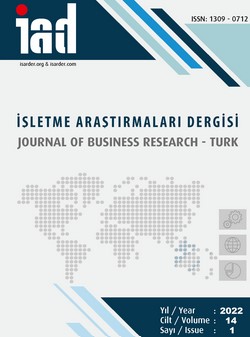Tüketicilerin Akıllı Giyilebilir Nesnelerin Kullanımına Yönelik Davranış Niyetlerinin Genişletilmiş Teknoloji Kabul Modeli Aracılığıyla İncelenmesi
Investigation of Consumers' Behavioral Intentions to Use Smart Wearables Through Extended Technology Acceptance Model
Author(s): İlker TİRYAKİ, Leyla Gödekmerdan ÖnderSubject(s): Business Economy / Management, Behaviorism, ICT Information and Communications Technologies, Socio-Economic Research
Published by: İşletme Araştırmaları Dergisi
Keywords: Internet of Things; Smart Wearables Objects; Technology Acceptance Model;
Summary/Abstract: Purpose – With this study, it is aimed to examine which variables have an effect on the behavioral intentions of consumers for the use of smart wearables working with IoT technology with in the scope of the extended technology acceptance model. Design/methodology/approach – The population of the research consists of consumers aged 18 and over in Ankara. Face-to-face survey technique and convenience sampling method were used to collect data in the study. SPSS 23 and AMOS 23 statistical package programs were used in the analysis of the data. 451 consumers aged 18 and overliving in Ankara were included in the study. Today, the entire product range of smart wearables offered to consumers has been included in the research area. To achieve the purpose of the research, a research model was created with 10 variables (information technology knowledge, social impact, privacy and security, perceived ease of use, cost, trust, perceived usefulness, compatibility, attitude towards use and behavioral intention to use) and technology acceptance model was expanded. Findings – According to the findings obtained in the study, it has been determined that the independent variables of information technology knowledge, perceived ease of use and perceived usefulness, which are evaluated to have an effect on the behavioral intentions of consumers to use smart wearables, have a positive and significant effect on the dependent variable of attitude towards use. It was determined that the dependent variable of attitude towards use had a positive and significant effect on the dependent variable of behavioral intention to use.
Journal: İşletme Araştırmaları Dergisi
- Issue Year: 14/2022
- Issue No: 1
- Page Range: 182-202
- Page Count: 21
- Language: Turkish

